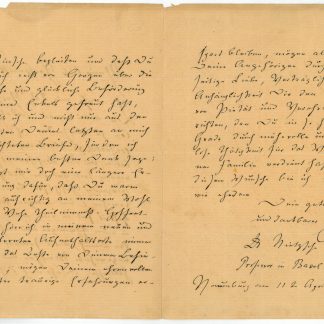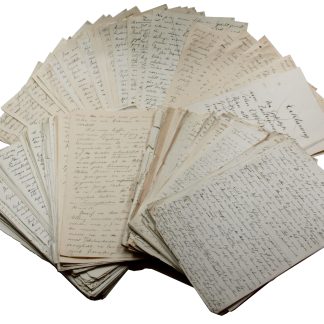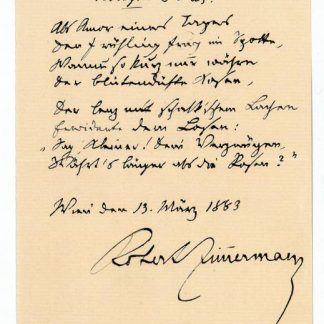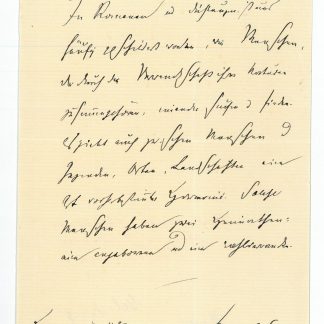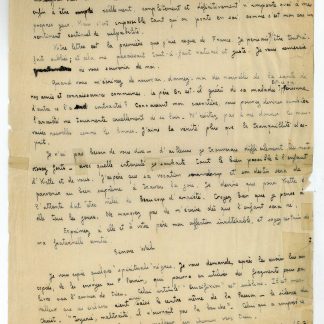"I love truth more than peace of mind": Simone Weil in New York
Autograph letter signed "Simone Weil" (fragment).
4to. 1 p. In French. Together with a letter by Gustave Thibon.
$9,248.00
Exceedingly rare, historically important letter from Simone Weil's brief stay in New York, undoubtedly written to the philosopher Gustave Thibon (1903-2001), who had hosted her on his farm in Saint-Marcel-d'Ardèche from 1941 until her departure in May 1942, concerning her religiosity, news from mutual friends France, and the pregnancy of Thibon's wife Yvette.
In the first part of the fragment, Weil speculates about a way to "manage to be used by God in an uninterrupted way", which should achieve a liberating negation of any sense of self-importance: "It would be to finally be truly, completely and definitively whatever [n'importe quoi] in my own eyes." This is, however, "impossible as long as one carries within oneself, as I do, a continual feeling of guilt". She then thanks Thibon for remembering her, as his letter was the first that she received from France, which led her to believe that she had been "completely forgotten there", although that would have seemed "quite natural and right" to her. Weil asks for news about "mutual friends and acquaintances", specifically asking about the illness of a "Father Br.", asserting: "Knowing my character, you can guess how anxiety torments me cruelly from so far away. Don't hesitate to give me the bad news as well as the good. I love truth more than peace of mind". In closing, Weil mentions the pregnancy of Thibon's wife Yvette with their first child, wishing them well: "I hope that its vocation and destiny will be to achieve supreme good through joy. I can imagine that for Yvette, the waiting time must be mixed with a great deal of anxiety. I think of her every day. Please write to me as soon as the child is born".
In a postscript, Weil promises to attach copies of the lyrics of "some Negro 'spirituals'", requesting them to be forwarded to her spiritual mentor Father Joseph-Marie Perrin, so that he can use them "for his book on the love of God". She specifically praises the song "He Never Said a Mumblin' Word" that was first recorded 1913, here alternately called "Crucifixion", interpreting it as a song that captures "the very centre of the Passion - Christ's silence" through the experience of slavery: "The one entitled 'Crucifixion' is sublime. It's wonderful that these slaves should have captured the very centre of the Passion - Christ's silence. Insulted, mistreated, he did not open his mouth'. Whoever wrote this poem truly knew how to turn misfortune into a path to God".
Simone Weil was introduced to Gustave Thibon by Joseph-Marie Perrin after she had expressed her desire to work on a farm, following work in an automobile factory. Although Thibon was at first hesitant, the two would form a deep friendship, and the encounter with Weil affected him profoundly. On 16 May 1942 she reluctantly left France, accompanying her parents to New York, as she knew that they would not have left without her. By late November 1942, she arrived in England, from where she hoped to be able to join the Résistance. However, Weil's ever fragile health failed rapidly, and she died on 17 August 1943.
While Perrin's book project on the love of God mentioned in the letter does not seem to have materialised, Gustave Thibon and Joseph-Marie Perrin published a memoir of their encounter with Weil in 1952: "Simone Weil telle que nous l'avons connue".
The included letter by Thibon, dated 8 February 1956, was addressed to a graphologist, asking her to analyse the originally enclosed "letter with signature" of his deceased female "best friend": "Voici une lettre avec signature. Si vous disposez de quelques minutes, je serais ravi d'avoir votre opinion sur l'écriture de celle qui fut ma meilleure amie". It is plausible that the original enclosure was indeed Simone Weil's letter to Thibon from New York.
Weil's letter with several professionally restored tears and additional minor tears. No text loss. Slightly creased.


